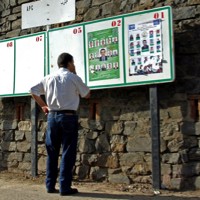While attempts to frame Algeria within the Arab Spring narrative have proved unrealistic, some observers thought the country’s May 10 parliamentary elections could present an opportunity for substantive political change. European and American officials lauded President Abdelaziz Bouteflika’s invitation to international organizations to send election observers, as well as recently passed “reforms,” as progress toward democracy, likening these moves to Morocco’s top-down reform process enacted at the onset of the regional uprisings.
But Algeria’s ability to avoid the upheaval that has swept North Africa over the past year has less to do with a proactive leadership and more to do with its wary, apathetic citizenry that is both traumatized from the violence of the 1990s and disenchanted with the country's political institutions. Past elections have been characterized by widespread abstention and manipulation, and Algerians had little reason to believe that this time would be different. It is also important to point out that while these elections took place during a dynamic period in the region, their domestic significance pales in comparison to the country’s presidential election, planned for 2014, which could offer a rupture with the aging Bouteflika’s leadership.
Algeria’s singularity also resides in its ties with Western powers, based on its significant oil exports and strategic role in the war on terror. The United States government defines Algeria as “a major partner in combating extremism and terrorist networks such as al-Qaida and is [its] second-largest trading partner in the Arab world.” After Bouteflika lifted the country’s decade-long state of emergency in February, U.S. President Barack Obama congratulated Algerian authorities and characterized the decision as the first of many upcoming steps toward democratic openness. But if ending emergency rule was a superficial means of signaling progress, it was by no means a catalyst for further change: Human Rights Watch reported that Algeria continued to refuse requested visits by the United Nations Human Rights Council, and citizens remained restive, frequently protesting poor living conditions, inadequate access to housing and widespread corruption.

